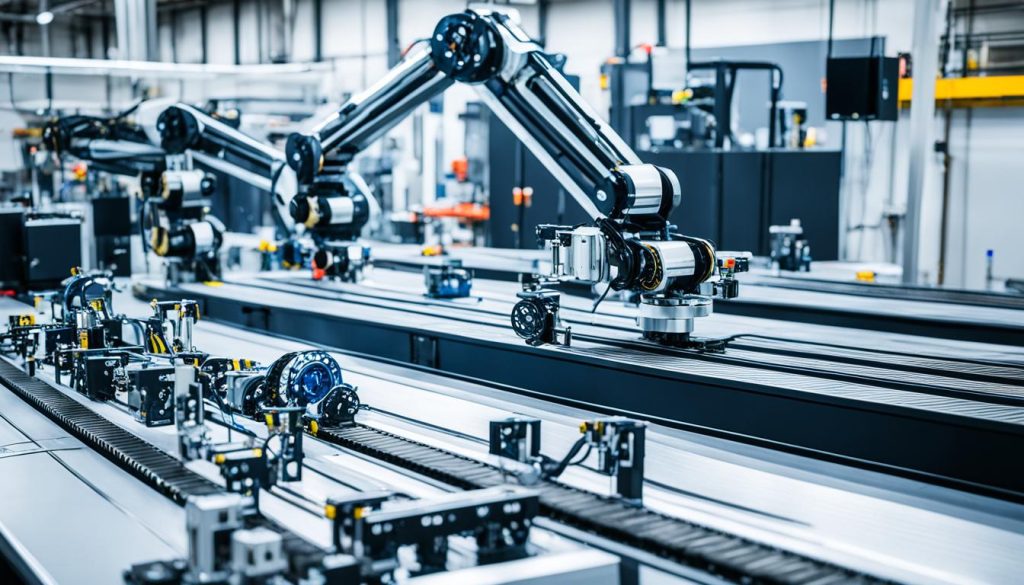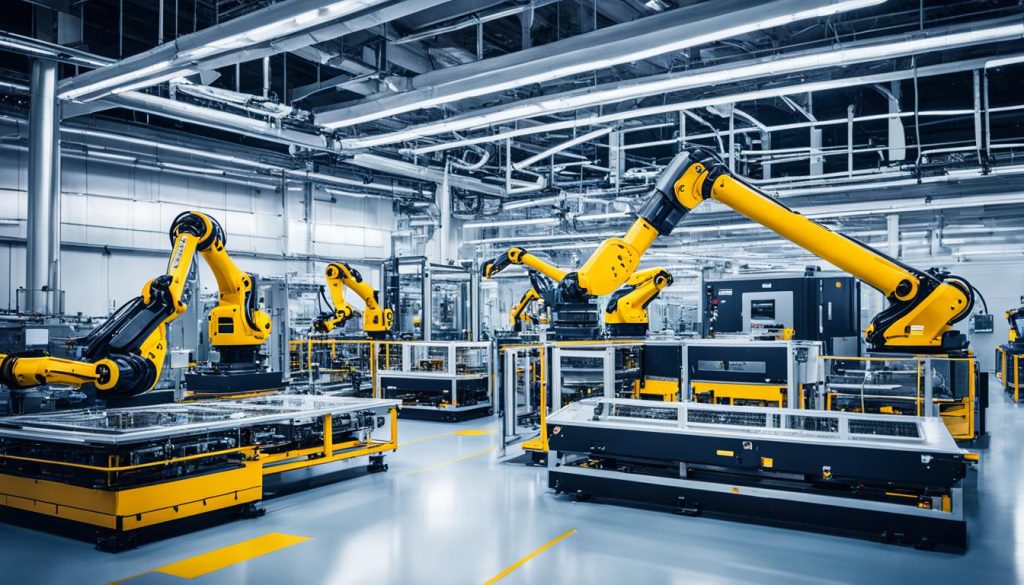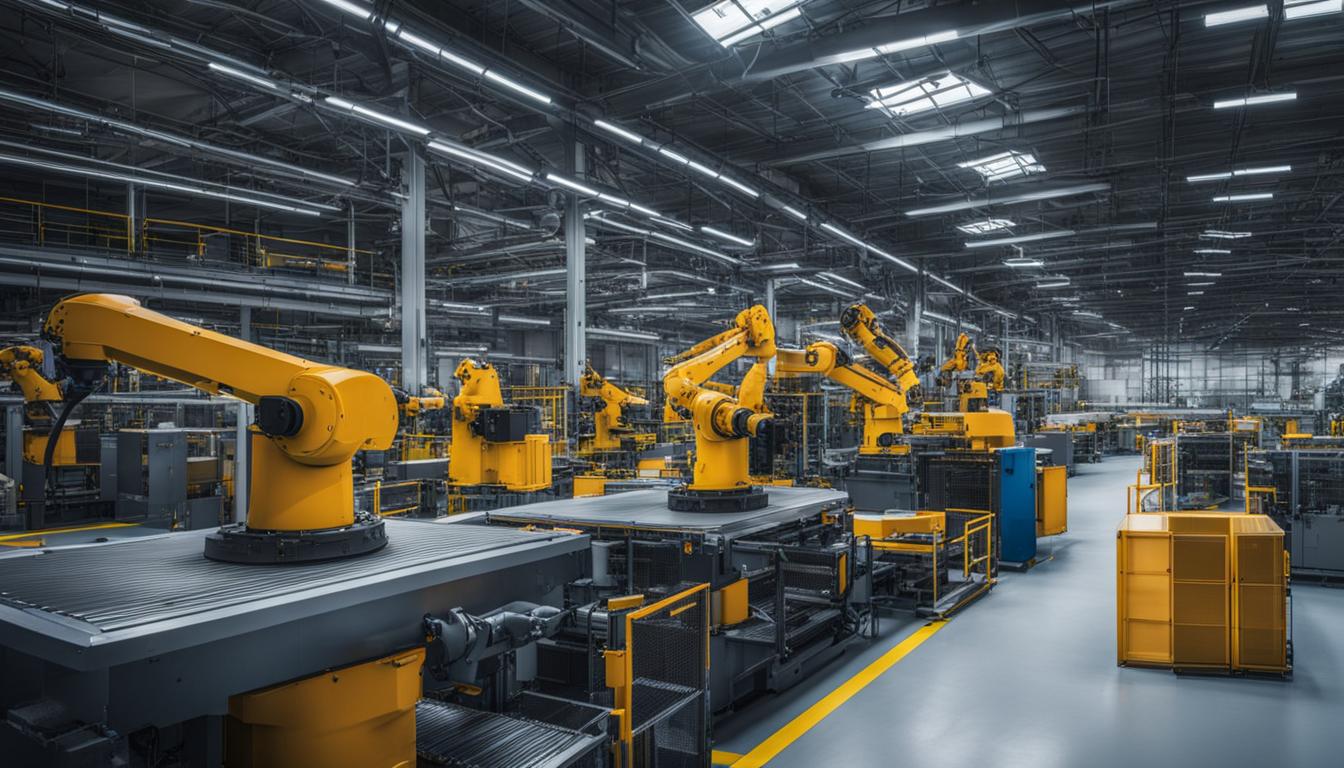Did you know that the global manufacturing industry is undergoing a major transformation? With the rise of modern manufacturing techniques and industrial innovation, the future of production is becoming increasingly automated and efficient. The integration of automated manufacturing systems, digital solutions, and cutting-edge technology is revolutionizing the way products are manufactured and optimizing every stage of the production process. From improved efficiency to enhanced quality control, the impact of advancements in manufacturing technologies is far-reaching.
Key Takeaways:
- Advancements in manufacturing technologies are driving the future of production.
- Automated manufacturing systems and digital solutions improve efficiency and quality control.
- The implementation of cutting-edge technology optimizes every stage of the production process.
- The global manufacturing industry is undergoing a major transformation.
- Embracing advancements in manufacturing technologies is crucial for staying competitive.
The Impact of Advancements in Manufacturing Technologies on Efficiency
The advancements in manufacturing technologies have revolutionized the industry, driving significant improvements in production efficiency. Through the utilization of automation and digital solutions, manufacturers can streamline their processes, resulting in faster and more accurate production.
One of the key benefits of these advancements is the reduction of errors and waste. By incorporating cutting-edge manufacturing technology, such as robotics and advanced machinery, manufacturers can achieve precise control over the production process. This level of control ensures consistent quality and reduces the need for manual intervention, leading to enhanced efficiency.
Digital manufacturing solutions, including artificial intelligence and data analytics, play a pivotal role in optimizing operations. With real-time insights and predictive capabilities, manufacturers can make data-driven decisions to improve efficiency and reduce downtime. By leveraging these technologies, companies can proactively address production challenges and optimize resource allocation.
The following table highlights the impact of advancements in manufacturing technologies on production efficiency:
| Advancements in Manufacturing Technologies | Impact on Efficiency |
|---|---|
| Automation | Streamlined processes, reduced errors, and increased speed |
| Digital Solutions | Real-time insights and predictive capabilities for data-driven decision making |
| Cutting-Edge Manufacturing Technology | Precise control over the production process and enhanced quality |
Overall, advancements in manufacturing technologies have revolutionized the industry by significantly improving production efficiency. From automation to digital solutions, manufacturers can reap the benefits of enhanced speed, reduced errors, and optimized operations. Embracing these cutting-edge technologies is essential for companies aiming to stay competitive in the modern manufacturing landscape.
The Role of Advancements in Manufacturing Technologies in Quality Control
Advancements in manufacturing technologies have revolutionized the quality control processes in the industry. Through the integration of smart factory advancements and Industry 4.0 developments, manufacturers can ensure that their products meet or exceed quality standards.
Automated manufacturing systems equipped with sensors and advanced algorithms play a crucial role in detecting defects or deviations from specifications. By providing instant feedback and corrective actions, these systems significantly reduce the risk of human errors and increase the overall quality of manufactured products.
Data analytics also play a key role in optimizing quality control processes. Manufacturers can leverage data from real-time monitoring and analysis to identify trends and patterns, making informed decisions that continuously improve product quality.
“Advancements in manufacturing technologies have brought quality control to a new level. With smart factory advancements and Industry 4.0 developments, manufacturers can ensure that their products consistently meet the high standards demanded by consumers.”
By embracing these advancements, manufacturers can enhance their quality control processes, maintaining customer satisfaction and gaining a competitive edge in the industry.

The Benefits of Advancements in Manufacturing Technologies for Quality Control
- Real-time monitoring and analysis for instant feedback and corrective actions
- Reduction of human errors and improvement of overall product quality
- Ability to identify trends and patterns through data analytics
- Continuous improvement and optimization of quality control processes
The Future of Quality Control in Manufacturing
With further advancements in manufacturing technologies, the future of quality control holds even more promise. The integration of artificial intelligence, machine learning, and advanced sensors will enable manufacturers to achieve even higher levels of precision and efficiency in quality control processes.
| Key Advancements | Impact on Quality Control |
|---|---|
| Artificial Intelligence | Intelligent automation and predictive analytics for enhanced quality control |
| Machine Learning | Ability to detect complex defects and deviations in real-time |
| Advanced Sensors | Improved accuracy and precision in quality control measurements |
As manufacturing technologies continue to evolve, quality control will remain a critical focus area for manufacturers seeking to deliver high-quality products and gain a competitive advantage.
The Future of Production: Smart Factory Advancements
The future of production is driven by advancements in manufacturing technologies, particularly the implementation of smart factory advancements. Smart factories revolutionize production environments by utilizing automated manufacturing systems and Industry 4.0 technologies. These advancements enable real-time communication and collaboration between machines, systems, and people, resulting in highly efficient and flexible production processes.
Smart factories incorporate automated manufacturing systems that handle repetitive tasks, freeing up human workers to focus on more complex and value-added activities. Robotics and machine learning are key components of these automated systems, ensuring precision and productivity in manufacturing operations.
The integration of data analytics, artificial intelligence (AI), and the Internet of Things (IoT) plays a crucial role in smart factory advancements. Data analytics provides insights and predictive capabilities that optimize production planning and resource allocation. AI algorithms enable proactive decision-making and enhance production efficiency. IoT connectivity allows real-time monitoring and control of production processes, leading to reduced downtime and improved responsiveness to market demands.
Implementing smart factory advancements offers several benefits to manufacturers:
- Increased productivity: Automated systems and real-time communication enable streamlined operations, resulting in higher production output.
- Cost savings: Optimized resource allocation and reduced downtime contribute to lower manufacturing costs.
- Improved quality control: Data analytics and AI-driven monitoring systems ensure product consistency and reduce defects.
- Enhanced agility: Agile production planning and predictive maintenance enable manufacturers to quickly adapt to market changes and optimize production schedules.

As smart factory advancements continue to evolve, the future of production holds even more potential. The seamless integration of automated manufacturing systems, data analytics, AI, and IoT will unlock further opportunities for efficiency, sustainability, and innovation in the manufacturing industry.
Embracing the Potential of Digital Manufacturing Solutions
Digital manufacturing solutions play a pivotal role in shaping the future of production. These solutions encompass various cutting-edge technologies, including artificial intelligence, data analytics, cloud computing, and additive manufacturing. By harnessing the power of these technologies, manufacturers can optimize their operations, enhance product quality, and drive innovation in the industry.
One of the key technological advancements is artificial intelligence, which enables intelligent automation and predictive analytics. By integrating AI into manufacturing processes, companies can significantly improve process efficiency and streamline quality control. AI-powered systems can autonomously identify patterns, detect anomalies, and make real-time adjustments to minimize errors and defects, ensuring consistent product quality.
Data analytics is another critical component of digital manufacturing solutions. By leveraging advanced data analytics techniques, manufacturers can gain valuable insights into their production processes and customer behavior. They can analyze large volumes of data to optimize resource allocation, identify trends, and make informed decisions about product design, production planning, and supply chain management.
The advent of cloud computing has revolutionized collaboration and data sharing across global supply chains. Manufacturers can securely store and access large amounts of data on the cloud, facilitating real-time communication between different stakeholders. Cloud-based platforms enable seamless collaboration, leading to increased efficiency, improved coordination, and faster decision-making.
One of the most exciting developments in digital manufacturing solutions is additive manufacturing, commonly known as 3D printing. This technology offers unprecedented possibilities for rapid prototyping, customization, and on-demand production. Manufacturers can create complex geometries and intricate designs with greater ease, accelerating the product development cycle and reducing time-to-market. Additionally, 3D printing allows for efficient use of materials, minimizing waste and making production processes more sustainable.
The integration of digital manufacturing solutions enables manufacturers to unlock new levels of efficiency, quality, and innovation. By harnessing the power of AI, data analytics, cloud computing, and additive manufacturing, companies can drive productivity, optimize operations, and stay ahead in an increasingly technologically-driven industry.
To illustrate the potential of digital manufacturing solutions, consider the following table that highlights the key benefits and applications of these technologies:
| Technology | Benefits | Applications |
|---|---|---|
| Artificial Intelligence | – Intelligent automation and predictive analytics – Enhanced process efficiency and quality control | – Machine monitoring and predictive maintenance – Quality control and defect detection |
| Data Analytics | – Valuable insights into production processes and customer behavior – Informed decision-making | – Production optimization and resource allocation – Supply chain management and demand forecasting |
| Cloud Computing | – Seamless collaboration and data sharing – Improved coordination and faster decision-making | – Supply chain visibility and real-time communication – Collaborative product development |
| Additive Manufacturing (3D Printing) | – Rapid prototyping and customization – Efficient use of materials and sustainability | – Prototyping and product development – Customized manufacturing and spare parts production |
Embracing digital manufacturing solutions is crucial for manufacturers who aim to stay competitive and thrive in the future of production. By adopting these cutting-edge technologies, companies can unlock new opportunities, improve operational efficiency, enhance product quality, and drive innovation in the industry.
Enhancing Sustainability Through Advancements in Manufacturing Technologies
Advancements in manufacturing technologies have a significant impact on sustainability in the industry. These technologies enable the development of sustainable manufacturing practices by reducing energy consumption, minimizing waste generation, and optimizing resource utilization.
Cutting-edge manufacturing technology, such as advanced materials, improved process control, and recycling systems, contribute to a more sustainable production ecosystem. Automation and digital solutions also play a crucial role in sustainability by enabling smarter resource management and reducing the environmental footprint of manufacturing processes.
By embracing these advancements, manufacturers can strive towards more sustainable and environmentally-responsible production practices, ensuring a better future for both the industry and the planet.
| Benefits of Advancements in Manufacturing Technologies in Enhancing Sustainability | Examples |
|---|---|
| Reduced energy consumption | Implementation of energy-efficient machinery and processes |
| Minimized waste generation | Recycling and waste management systems |
| Optimized resource utilization | Data-driven resource allocation and inventory management |
| Advanced materials for sustainability | Bio-based materials, lightweight alloys, and eco-friendly alternatives |
| Improved process control | Real-time monitoring and automated quality control |
| Smarter resource management | Automation and data analytics for efficient resource allocation |
By implementing sustainable manufacturing practices, companies can not only reduce their environmental impact but also improve cost-efficiency and brand reputation. The future of production lies in the integration of advancements in manufacturing technologies with sustainable practices, driving the industry towards a greener and more responsible future.
The Global Impact of Advancements in Manufacturing Technologies
The advancements in manufacturing technologies have a global impact on the manufacturing industry. Industrial innovation and the adoption of cutting-edge manufacturing technology contribute to economic growth, job creation, and increased competitiveness among countries. Countries that invest in research and development of manufacturing technologies are more likely to attract investment and drive industrial growth.
These advancements also enable the reshoring of manufacturing operations, bringing production closer to consumer markets and reducing dependence on overseas suppliers. Furthermore, the global adoption of advanced manufacturing technologies promotes knowledge transfer and collaboration among nations, fostering industry-wide improvements and sharing best practices.
“The global impact of advancements in manufacturing technologies underscores the importance of embracing these technologies to stay at the forefront of industrial development.”
As seen in the table below, the global manufacturing industry has experienced significant growth in recent years, driven by advancements in manufacturing technologies.
| Year | Global Manufacturing Output (USD) |
|---|---|
| 2015 | 12.2 trillion |
| 2016 | 12.8 trillion |
| 2017 | 13.7 trillion |
| 2018 | 14.7 trillion |
| 2019 | 15.5 trillion |
The global impact of advancements in manufacturing technologies highlights the need for countries and companies to continue investing in industrial innovation and the adoption of cutting-edge manufacturing technology. This will not only drive economic growth and job creation but will also ensure that the manufacturing industry remains competitive in the global market.
Overcoming Challenges in Implementing Advancements in Manufacturing Technologies
Implementing advancements in manufacturing technologies presents exciting opportunities, but it also comes with its fair share of challenges. As manufacturers strive to embrace modern manufacturing techniques, they must navigate several hurdles to ensure successful implementation and maximize the benefits.
The Initial Investment:
One of the primary challenges lies in the initial investment required to adopt and integrate these technologies into existing manufacturing processes. This involves upgrading infrastructure, acquiring advanced equipment, and implementing new systems. Such investments can be costly and time-consuming, requiring careful financial planning and strategic decision-making.
Specialized Skills and Knowledge:
Another challenge is the need for specialized skills and knowledge to operate and maintain these advanced technologies. Manufacturers must ensure that their workforce is adequately trained and upskilled to harness the full potential of these advancements. Investing in training programs and developing talent pipelines become crucial to bridge the skills gap and build a competent workforce.
Resistance to Change:
Resistance to change and concerns about job displacement due to automation can also pose challenges. As technology advances, some employees may fear the loss of their jobs or struggle to adapt to new processes. Effective change management strategies, which include clear communication, engaging employees in the transition, and addressing concerns, are fundamental in overcoming resistance and fostering a positive organizational culture.
Integration and Scalability:
Integrating new technologies into existing manufacturing systems and ensuring scalability can be complex. Manufacturers need to carefully plan and execute the integration process, ensuring compatibility, interoperability, and minimal disruption to ongoing operations. Scalability considerations are vital to accommodate future growth and changing market demands effectively.
Infrastructure and Data Security:
Implementing modern manufacturing techniques often involves leveraging data-driven technologies and interconnected systems. It is essential for manufacturers to establish robust infrastructure and implement rigorous data security measures to protect sensitive information and prevent cyber threats.
To overcome these challenges, manufacturers must adopt a strategic and phased approach to implementation. Prioritizing investments, providing comprehensive training and support to employees, building a culture of innovation and continuous learning, and effectively communicating the benefits of advancements are key factors in successful implementation.
By proactively addressing these challenges, manufacturers can unlock the full potential of advancements in manufacturing technologies and position themselves for long-term success in an evolving industry landscape.
Conclusion
The constant advancements in manufacturing technologies have paved the way for a transformative future of production. From automated manufacturing systems to smart factory advancements and digital manufacturing solutions, these innovations offer immense potential for improving efficiency, quality, sustainability, and global competitiveness in the manufacturing industry.
However, realizing the full benefits of these advancements requires careful planning, execution, and overcoming various challenges. Manufacturers must strategically plan and invest in the adoption of these technologies, considering factors such as initial investment, infrastructure upgrades, and workforce development. It is crucial for manufacturers to provide training and upskilling opportunities to their employees, empowering them to operate and maintain these cutting-edge technologies effectively.
Additionally, effective communication and change management play a vital role in successful implementation. Manufacturers need to communicate the value and benefits that these advancements bring, not only to their own operations but also to the industry as a whole. This will help foster a culture of innovation, collaboration, and continuous improvement, ensuring sustainable growth and success in the manufacturing sector.
Looking ahead, the future of manufacturing is bright, driven by ongoing innovation and the continuous development of modern manufacturing techniques. The advancements in manufacturing technologies will shape the industry for years to come, driving industrial innovation, enhancing productivity, and propelling the manufacturing sector towards new horizons.
FAQ
What are the advancements in manufacturing technologies?
Advancements in manufacturing technologies refer to the development and implementation of modern manufacturing techniques and industrial innovation. These include automated manufacturing systems, cutting-edge manufacturing technology, digital manufacturing solutions, and smart factory advancements.
How do advancements in manufacturing technologies improve efficiency?
Advancements in manufacturing technologies, such as automation and digital solutions, improve efficiency by enabling faster and more accurate production processes, reducing errors and waste. They also allow for precise control over the manufacturing process and provide real-time insights and predictive capabilities, optimizing operations and making data-driven decisions.
What is the role of advancements in manufacturing technologies in quality control?
Advancements in manufacturing technologies play a crucial role in quality control by enabling real-time monitoring, data analysis, and instant feedback. Smart factory advancements and Industry 4.0 developments allow for automated systems to detect defects or deviations from specifications, resulting in improved product quality. Data analytics also provide valuable insights for optimizing quality control processes.
What are smart factories and how do they shape the future of production?
Smart factories utilize automated manufacturing systems and Industry 4.0 technologies to create efficient and flexible production environments. These advancements enable real-time communication and collaboration between machines, systems, and people, resulting in streamlined operations, optimized resource allocation, and reduced downtime. Smart factories offer increased productivity, cost savings, and improved responsiveness to market demands.
How do digital manufacturing solutions contribute to the future of production?
Digital manufacturing solutions encompass technologies like artificial intelligence, data analytics, cloud computing, and additive manufacturing. These solutions optimize operations, enhance product quality, and drive innovation. Artificial intelligence enables automation and predictive analytics, data analytics provide insights for informed decision-making, cloud computing enables collaboration, and additive manufacturing offers rapid prototyping and customization.
How do advancements in manufacturing technologies contribute to sustainability?
Advancements in manufacturing technologies contribute to sustainability by reducing energy consumption, minimizing waste generation, and optimizing resource utilization. Cutting-edge manufacturing technology, automation, and digital solutions enable sustainable manufacturing practices. These advancements help create a more environmentally responsible production ecosystem.
What is the global impact of advancements in manufacturing technologies?
Advancements in manufacturing technologies contribute to global economic growth, job creation, and increased competitiveness among countries. They attract investment and drive industrial growth. These advancements also enable reshoring of manufacturing operations, bringing production closer to consumer markets and fostering knowledge transfer and collaboration among nations.
What are the challenges in implementing advancements in manufacturing technologies?
The challenges in implementing advancements in manufacturing technologies include the initial investment required, the need for specialized skills and knowledge, and the resistance to change. Manufacturers must carefully plan and execute their adoption, invest in training and upskilling, and effectively communicate the benefits to overcome these challenges.
What is the future of production with advancements in manufacturing technologies?
The future of production is shaped by ongoing innovation and the continuous development of cutting-edge technologies. Advancements in manufacturing technologies offer vast potential for improving efficiency, quality, sustainability, and global competitiveness in the manufacturing industry.







